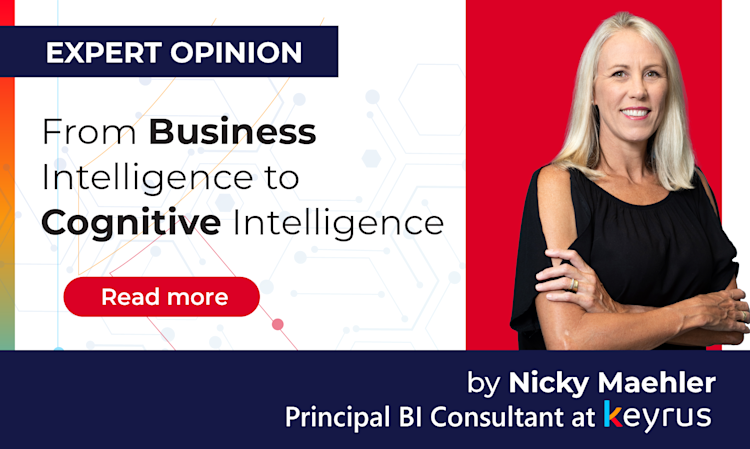For decades, Business Intelligence (BI) has helped organisations make sense of data. It’s been the foundation of data-driven decision-making: clean dashboards, clear KPIs, and focused reporting that tells us 'what happened' and sometimes 'why it happened'. But the world has changed. Fast.
We’re entering a new era. Era driven by Cognitive Intelligence (CI), a leap forward that doesn’t just show us the data but thinks with us. Powered by advancements in artificial intelligence and machine learning, CI is the natural evolution of BI. It’s not simply an upgrade in reporting, t’s a shift in how decisions get made, who makes them, and how fast they happen.
What is CI?
Cognitive Intelligence is a fancy term, but at its core, it's about systems that don’t just process data - they understand it, learn from it, and act on it. Think of CI as the brainpower behind your data. Where BI tells you, “Sales dropped 10% last month,” CI tells you 'why it happened, what will likely happen next, and what to do about it'. Automatically.
CI systems use a mix of technologies:
Machine Learning to recognise patterns and improve over time
Natural Language Processing (NLP) to understand human language and queries
Context Awareness to factor in the bigger picture (seasonality, market shifts, business rules)
Automation to take real-time action, not just inform you, but take action
In short, CI turns your data into a digital advisor: alerting you, coaching you, and even making decisions alongside you.
Why this shift matters
The traditional BI model has served us well. But it has limits:
It’s largely reactive
It relies heavily on human interpretation
It’s slow to adapt when things change fast
In contrast, CI thrives on speed, scale, and autonomy. As business environments become more volatile and competitive, the ability to make fast, intelligent decisions isn’t a luxury - it’s a necessity.
A dashboard that just sits there passively isn’t enough anymore. We need smart systems that adapt, learn, and guide us proactively.
The new role of Data Teams
Here’s the critical takeaway: Data Teams must evolve, or risk becoming obsolete.
For years, Data Teams have been seen as report builders and dashboard developers. They focused on collecting data, cleaning it, and visualising it. Valuable work — but no longer sufficient.
In the CI era, the data team becomes a strategic enabler of decision automation and intelligence. That means:
Designing systems that learn and improve with each data cycle
Working across business units to deeply understand context and decision-making logic
Building models that detect anomalies, risks, and opportunities and then recommend or take action
Creating self-service, intuitive tools that empower end users without compromising data quality or governance.
This is not just a change in tools. It’s a change in mindset.
From report builders to intelligence architects
The skills required are expanding. It’s not enough to know SQL or how to build a Power BI dashboard. Teams need to:
Understand business context as well as data pipelines
Design feedback loops where systems continuously learn and improve
Collaborate with engineers, product teams, and business leaders
Champion data fluency and democratization, enabling others to participate in the intelligence layer
This means embracing automation, experimentation, and yes — risk-taking. CI systems thrive on iteration and learning, not perfection.
The payoff is enormous
This shift isn’t just a technical change. It’s a competitive advantage.
Teams that adopt CI can:
Spot risks early and respond instantly
Surface emerging trends before competitors
Free up human time by automating the repeatable
Build organizations that are resilient, responsive, and always learning
In practical terms? Less fire-fighting, more foresight. Fewer static reports, more actionable intelligence. And a business that gets smarter the more it operates.
The natural evolution of Business Intelligence
This isn’t about throwing away BI. It’s about leveling it up. The core principles: data rigor, curiosity, storytelling still matter. But the tools, expectations, and pace have changed.
Cognitive Intelligence is not some buzzword trend. It’s the next natural step in how we extract value from data. The question is no longer if your team needs to evolve, but how fast you can do it.
Because while others are still debating dashboards, CI-ready teams will already be acting on tomorrow’s insights.
Bottom Line: Evolving from BI to CI is not a luxury, it’s an imperative. For data teams willing to stretch beyond reporting and into real-time, context-aware intelligence, the future is wide open. The rest? Risk being left behind in the dust of dashboards.
Ready to evolve from BI to CI?
At Keyrus, we help forward-thinking organizations make the leap from static reporting to adaptive, intelligent systems. Whether you’re rethinking your data architecture, modernising your analytics platforms, or preparing your team for an AI-first world, we bring the strategy, skills, and tools to accelerate your transition from Business Intelligence to Cognitive Intelligence.
Our multidisciplinary teams combine deep data engineering expertise, proven AI frameworks, and real-world business understanding to build scalable, smart, and secure solutions tailored to your needs. And as a Microsoft Cloud Solution Provider and partner across leading platforms like Snowflake, Databricks, and Tableau, we offer end-to-end support from advisory to execution. Contact us for a solution tailored to your organization’s needs. Sales@keyrus.co.za
